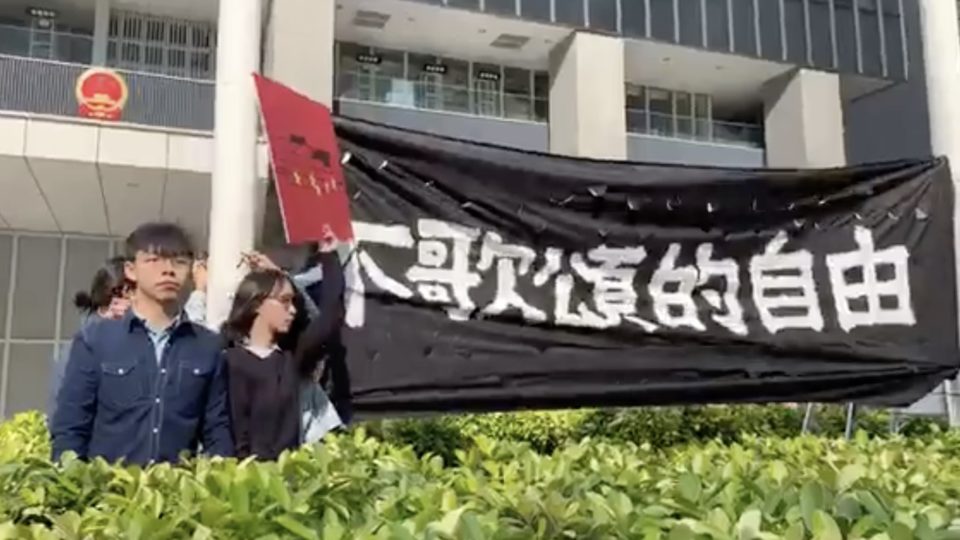Protesters greeted the formal introduction in the Legislative Council today of Hong Kong’s controversial proposed national anthem law, which would penalize with prison time any “disrespect” towards China’s anthem.
The law has already been the subject of intense criticism, in particular its allegedly vague definition of what constitutes an insult, which some in Hong Kong’s pro-democracy camp fear could be used as a cudgel against legitimate criticism of the mainland. The concerns come amid what at least one human rights group has characterized as a sustained assault by Beijing on Hong Kong’s special freedoms under the “one country, two systems” principle.
Patrick Nip Tak-kuen, Hong Kong’s secretary of constitutional and mainland affairs, alluded to these concerns during his introduction of the bill on the floor of the LegCo today.
“I know some people want us to comment on whether certain acts would breach” the provisions of the law, he said in his remarks, adding only that such a determination would be based on “evidence.”
“We want to prevent people from insulting the national anthem with intent,” he added. “So if people don’t have any intent to insult the national anthem there his no need for them to worry about being caught inadvertently.”
“The spirit of the bill is respect. We believe this is easy for the public to understand, and easy for them to comply,” he continued. “We believe most of our people would respect the national anthem, and therefore the bill will not affect the daily life of the people.”
Today’s introduction was only a “first reading” of the law, and did not include a substantive debate on its provisions, which Nip said would take place when the bill moves into committee.
Among other things, the bill outlaws playing the anthem “in a distorted or disrespectful way, with intent to insult.” It also forbids altering the anthem’s lyrics and its score. As well as possible jail time, offenders could also face fines of up to HK$50,000 (about US$6,300).
Booing China’s national anthem has been a staple of Hong Kong football matches for years, and one provision in the law anticipates the difficulty of identifying offenders in large crowds of fans, giving police two years to investigate possible violations before bringing charges.
The law will also require the anthem, called March of the Volunteers, and its history to be taught in all primary and secondary schools.
Outside the LegCo today, members of the pro-democracy political party Demosisto staged a brief protest against the legislation, stringing up a banner that read “The Right Not to Sing Our Praises.”
In remarks before the crowd, party chairman Ivan Lam called freedom of expression “one of the most important rights” enjoyed in Hong Kong, and asked authorities to suspend the legislative progress of the law to allow for a public consultation.
“We have the right not to express respect to the national anthem, which is a fundamental freedom that every Hongkonger has,” Lam said. “We hope all Hongkongers are aware of the problems regarding this law, and we hope in future there will be people protesting this law.”
Citing the potential for the legislation to be used to clamp down on broader dissent, pro-democracy legislator Claudia Mo has previously referred to the national anthem law as “the latest gesture, if not a weapon, to scare Hong Kong into obedience.”
The first moves to create the legislation came in 2017 after China passed a national anthem law of its own, then inserted it into Hong Kong’s mini-constitution, the Basic Law.
“In recent years, incidents of disrespect against the national anthem have occurred in Hong Kong, challenging the bottom line of the principle of one country, two systems and social morality, and triggering rage among Chinese including most Hong Kong residents,” Zhang Rongshun, deputy director for the Legislative Affairs Commission of the National People’s Congress’ Standing Committee, was quoted as saying at the time.
“It is urgent and important to apply the national anthem law in Hong Kong in a bid to prevent and handle such offenses.”




